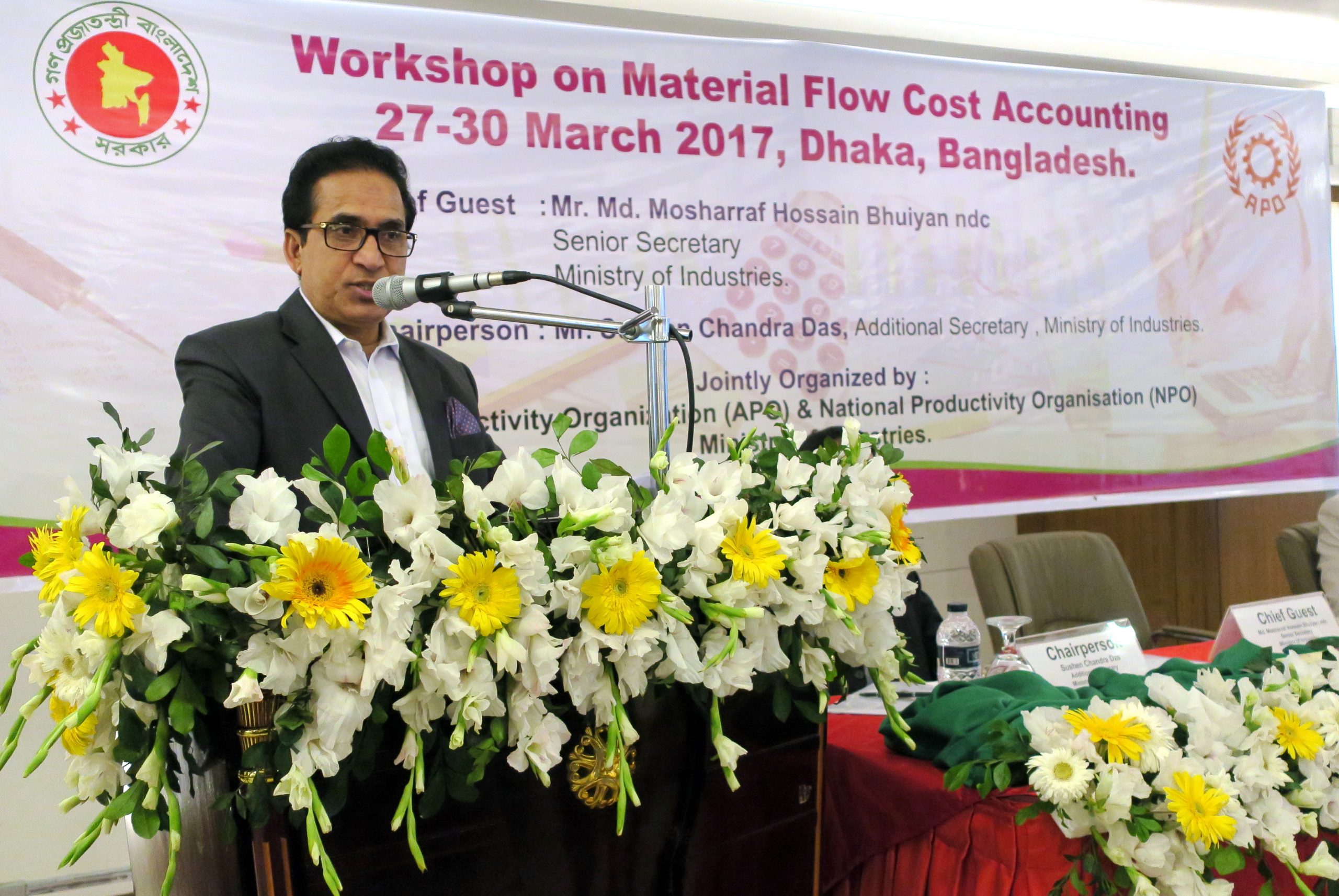
Select Page
The Asian Productivity Organization (APO) is conducting a four-day Workshop on Material Flow Cost Accounting (MFCA) in Dhaka, Bangladesh, 27–30 March 2017. The workshop aims to provide a platform for company executives, environmental management professionals, and MFCA practitioners to exchange experiences and knowledge of waste management and MFCA application.
The workshop will help 22 participants from 14 APO member countries understand the concept of the circular economy and good practices of MFCA implementation while helping the APO raise awareness of Green Productivity and sustainable development in the Asia-Pacific region.
Speaking at the inaugural session of the workshop, Senior Secretary M. Mosharraf Hossain Bhuiyan of the Bangladesh Ministry of Industries commented that while the country had achieved the desired success in agriculture, the government was now working toward sustainable, modern technology-based industrialization. “This international workshop will play a vital role in increasing productivity in industries of Asian countries,” he stated.

Bangladesh Ministry of Industries Senior Secretary M. Mosharraf Hossain Bhuiyan speaking at the inaugural session of the Workshop on MFCA.
The Senior Secretary also pointed out that the rational use of raw materials by industrial SMEs would help increase productivity and create opportunities to export numerous quality products. He emphasized that the Bangladesh government led by Prime Minister Sheikh Hasina had been working relentlessly to ensure sustainable, environment-friendly green industrialization aimed at becoming a developed country.
MFCA is a management tool focusing on the optimization of resources utilized in operational flows. It examines the use of materials and energy as well as the waste produced and then treats waste as resources, thereby reducing emissions and nonproducts, utilizing resources more efficiently, and improving productivity.
The concept of MFCA was first developed in Germany in the late 1990s and was later adopted widely by Japanese companies. With its international standard, ISO 14051, which complements the ISO 14000 family of environmental management system standards, MFCA has helped numerous SMEs to reduce waste and costs and thus increase profits and overall productivity. It has also been recognized and promoted by other international bodies, such as Asia-Pacific Economic Cooperation, as a powerful technique to address issues of productivity enhancement as well as environmental protection.
The APO has organized numerous projects related to MFCA, including four demonstration company projects in Thailand, Mongolia, India, and Pakistan, along with workshops and training courses in Japan, the ROC, and Indonesia. The APO has also conducted e-learning courses and published a training manual on ISO 14051 to build capacity among member countries on MFCA.
The workshop in Dhaka focuses on the applicability of MFCA in SMEs, the latest status of the standard, and how it links to the circular economy that contributes to more sustainable industrial development. After completing the workshop, the participants are expected to apply MFCA techniques in their organizations to raise their productivity.
Additional Secretary Sushen Chandra Das of the Ministry of Industries, Bangladesh, presided over the workshop, which is being conducted by three APO international experts: Strategy & Collaboration expert Martina Prox of Ifu Hamburg GmbH (Germany); Managing Director/Green Productivity Consultant Yap Yun Fung of EcoLean Consultancy Sdn. Bhd. (Malaysia); and Associate Professor Wichai Chattinnawat of Chiang Mai University (Thailand). The workshop follows the lecture, case study, site visit, discussion, and group work format.